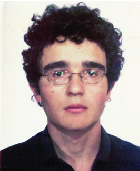Sasha Sodin 2007-2008

- Institution of PhD:
- Tel Aviv University
- Academic Discipline of PhD:
- Mathematics
- PhD Advisor/s:
- Prof. Vitali Milman
- Dissertation Topic:
- Random Matrices with Independent Entries, and Other Topics in Asymptotic Probability Theory
- Year Awarded PhD:
- 2010
- Institution of Postdoc:
- IAS
- Present Institution:
- Princeton University
- Present Academic Position:
- Assistant Professor
- Email:
- asodin@math.princeton.edu
- CV
- Publications
- Homepage
Sasha Sodin is a mathematician and assistant professor at Princeton University. Currently, Sasha is interested in the spectral properties of random operators originating from mathematical physics, particularly, random band and random Schroedinger operators.
Sasha received his PhD from Tel Aviv University in 2010. In his thesis “Random Matrices with Independent Entries, and Other Topics in Asymptotic Probability Theory” Sasha researched an area called Asymptotic Geometric Analysis, which has emerged in the last few decades at the border between Functional Analysis and Convex Geometry. Deep and multifarious connections have been discovered between this area and Probability Theory, Mathematical Physics, Combinatorics and Theoretical Computer Science, and methods from Asymptotic Geometric Analysis have found numerous applications. On the other hand, methods from Probability Theory, Classical Analysis and so on appear to be useful for solving purely geometric problems.
In his research, Sasha explored the possibility of promoting the interconnections between Asymptotical Geometric Analysis and the above subjects. Methods from Probability Theory have been applied in Analysis for many years. Recently, a new level of connection has appeared, focusing, on the one hand, on the study of probability measures of geometric origin (such as uniform distribution in a convex body) and, on the other, on the study of natural classes of probability measures (such as s-concave measures) from a geometric point of view.
Sasha has received the Haim Nessyahu Prize in Mathematics and the Wolf Foundation Scholarship for Ph.D. Students.
